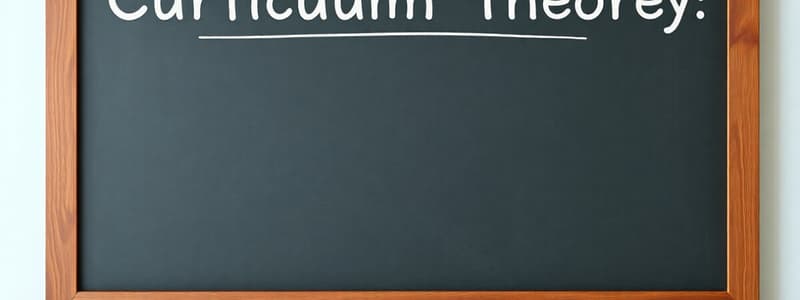Podcast
Questions and Answers
What is the primary focus of subject-centered curriculum?
What is the primary focus of subject-centered curriculum?
- Learner's interests
- Integration of social activities
- Problem-solving skills
- Mastery of subject matter (correct)
Which type of curriculum is rooted in the study of social problems and activities?
Which type of curriculum is rooted in the study of social problems and activities?
- Problem-centered (correct)
- Standard-centered
- Subject-centered
- Learner-centered
Which aspect is emphasized in learner-centered curriculum?
Which aspect is emphasized in learner-centered curriculum?
- Uniform educational standards
- Individual learner growth (correct)
- Lecture-based instruction
- Fixed subject matter
What characteristic is typical of problem-centered curriculum?
What characteristic is typical of problem-centered curriculum?
Where do the origins of subject-centered curriculum trace back to?
Where do the origins of subject-centered curriculum trace back to?
What does the achieved curriculum reveal about students and schools?
What does the achieved curriculum reveal about students and schools?
What defines the entitlement curriculum?
What defines the entitlement curriculum?
Which of the following accurately describes the hidden curriculum?
Which of the following accurately describes the hidden curriculum?
What is the focus of the implemented curriculum?
What is the focus of the implemented curriculum?
What does the null or censored curriculum refer to?
What does the null or censored curriculum refer to?
What is the primary focus of Idealism in education?
What is the primary focus of Idealism in education?
How does Realism approach the organization of its curriculum?
How does Realism approach the organization of its curriculum?
What guiding principle is associated with the Pragmatism philosophy in education?
What guiding principle is associated with the Pragmatism philosophy in education?
In the Idealism philosophy, how are truth and values viewed?
In the Idealism philosophy, how are truth and values viewed?
Which statement reflects the aim of education according to Realism?
Which statement reflects the aim of education according to Realism?
What does the term 'curriculum as content' refer to?
What does the term 'curriculum as content' refer to?
What is the primary characteristic of the 'ideal or recommended curriculum'?
What is the primary characteristic of the 'ideal or recommended curriculum'?
Which type of curriculum is officially recognized and prescribed by the government?
Which type of curriculum is officially recognized and prescribed by the government?
What does the 'implemented curriculum' primarily consist of?
What does the 'implemented curriculum' primarily consist of?
Which term describes what students actually learn after completing a curriculum?
Which term describes what students actually learn after completing a curriculum?
What is the primary focus of the Academic Rationalist Conception of curriculum?
What is the primary focus of the Academic Rationalist Conception of curriculum?
In the context of curriculum, what role does academic freedom play?
In the context of curriculum, what role does academic freedom play?
Which principle of learning in operant conditioning emphasizes the sustaining of learned behaviors?
Which principle of learning in operant conditioning emphasizes the sustaining of learned behaviors?
In the learning process, what is the phase that involves identifying the forces supporting the need for change?
In the learning process, what is the phase that involves identifying the forces supporting the need for change?
What is a key component of the 'curriculum as intended learning outcomes'?
What is a key component of the 'curriculum as intended learning outcomes'?
Which of the following is NOT a characteristic of the official curriculum?
Which of the following is NOT a characteristic of the official curriculum?
What is a key characteristic of the Humanistic Conception of curriculum?
What is a key characteristic of the Humanistic Conception of curriculum?
Which teaching strategy is essential for a teacher according to the psychological foundations of curriculum development?
Which teaching strategy is essential for a teacher according to the psychological foundations of curriculum development?
What are the principles of learning in operant conditioning primarily centered around?
What are the principles of learning in operant conditioning primarily centered around?
The Cognitive Processes Conception aims to develop what in students?
The Cognitive Processes Conception aims to develop what in students?
What is the goal-setting phase in the learning process meant to achieve?
What is the goal-setting phase in the learning process meant to achieve?
How do cultural traditions influence the curriculum?
How do cultural traditions influence the curriculum?
Which aspect is NOT influenced by laws regarding the curriculum?
Which aspect is NOT influenced by laws regarding the curriculum?
What was the primary focus of education during the Spanish rule?
What was the primary focus of education during the Spanish rule?
What characteristic defines education during the Historical Foundations period?
What characteristic defines education during the Historical Foundations period?
Which of the following was a curricular focus during American rule?
Which of the following was a curricular focus during American rule?
What was a significant educational change during the New Society period?
What was a significant educational change during the New Society period?
Which curricular aspect was emphasized during the Commonwealth period?
Which curricular aspect was emphasized during the Commonwealth period?
What was a primary goal of education during the Japanese occupation?
What was a primary goal of education during the Japanese occupation?
What aspect of education was a characteristic of the pre-colonial period?
What aspect of education was a characteristic of the pre-colonial period?
Which of the following best describes how moral values are reflected in the curriculum?
Which of the following best describes how moral values are reflected in the curriculum?
Flashcards
Curriculum as content or subject matter
Curriculum as content or subject matter
A list of topics or subjects covered in a specific academic field.
Curriculum as intended learning outcomes
Curriculum as intended learning outcomes
The intended learning outcomes specified in a curriculum.
Curriculum as planned learning experiences
Curriculum as planned learning experiences
The planned learning experiences designed for students, including teaching materials, methods, and assessments.
Ideal or Recommended Curriculum
Ideal or Recommended Curriculum
Signup and view all the flashcards
Intended, Official, or Written Curriculum
Intended, Official, or Written Curriculum
Signup and view all the flashcards
Implemented Curriculum
Implemented Curriculum
Signup and view all the flashcards
Achieved Curriculum or Learned Curriculum
Achieved Curriculum or Learned Curriculum
Signup and view all the flashcards
Curriculum as a discipline
Curriculum as a discipline
Signup and view all the flashcards
What is the Supported Curriculum?
What is the Supported Curriculum?
Signup and view all the flashcards
What is the Null or Censored Curriculum?
What is the Null or Censored Curriculum?
Signup and view all the flashcards
What is the Implemented Curriculum?
What is the Implemented Curriculum?
Signup and view all the flashcards
What is the Hidden Curriculum?
What is the Hidden Curriculum?
Signup and view all the flashcards
What is the Tested Curriculum?
What is the Tested Curriculum?
Signup and view all the flashcards
Subject-Centered Curriculum
Subject-Centered Curriculum
Signup and view all the flashcards
Learner-Centered Curriculum
Learner-Centered Curriculum
Signup and view all the flashcards
Problem-Centered Curriculum
Problem-Centered Curriculum
Signup and view all the flashcards
Origins of Subject-Centered Curriculum
Origins of Subject-Centered Curriculum
Signup and view all the flashcards
Roots of Learner-Centered Curriculum
Roots of Learner-Centered Curriculum
Signup and view all the flashcards
Idealism (Plato)
Idealism (Plato)
Signup and view all the flashcards
Realism (Aristotle)
Realism (Aristotle)
Signup and view all the flashcards
Pragmatism (Dewey, Rousseau)
Pragmatism (Dewey, Rousseau)
Signup and view all the flashcards
Idealism: Curriculum Implications
Idealism: Curriculum Implications
Signup and view all the flashcards
Realism: Curriculum Implications
Realism: Curriculum Implications
Signup and view all the flashcards
Unfreezing (Learning Process)
Unfreezing (Learning Process)
Signup and view all the flashcards
Problem Diagnosis (Learning Process)
Problem Diagnosis (Learning Process)
Signup and view all the flashcards
Goal Setting (Learning Process)
Goal Setting (Learning Process)
Signup and view all the flashcards
New Behavior (Learning Process)
New Behavior (Learning Process)
Signup and view all the flashcards
Refreezing (Learning Process)
Refreezing (Learning Process)
Signup and view all the flashcards
Cognitive Processes Conception
Cognitive Processes Conception
Signup and view all the flashcards
Humanistic Conception
Humanistic Conception
Signup and view all the flashcards
Academic Rationalist Conception
Academic Rationalist Conception
Signup and view all the flashcards
Cultural Tradition
Cultural Tradition
Signup and view all the flashcards
Textbook Influence
Textbook Influence
Signup and view all the flashcards
Legal Impact
Legal Impact
Signup and view all the flashcards
Moral Values in Curriculum
Moral Values in Curriculum
Signup and view all the flashcards
Research in Curriculum
Research in Curriculum
Signup and view all the flashcards
Pre-Spanish Period
Pre-Spanish Period
Signup and view all the flashcards
Spanish Period
Spanish Period
Signup and view all the flashcards
American Period
American Period
Signup and view all the flashcards
Commonwealth Period
Commonwealth Period
Signup and view all the flashcards
Japanese Period
Japanese Period
Signup and view all the flashcards
Study Notes
The Teacher and the School Curriculum
- Objectives include discussing the definition, principles, and concepts governing curriculum development
- Another objective is analyzing curricula that shaped Philippine education.
Curriculum as a Concept
- Curriculum encompasses all experiences children have under teacher guidance (Caswell and Campbell).
- It also refers to experiences designed to foster self-realization through active participation in school (Shepherd & Ragan).
- A curriculum is a learning plan encompassing strategies for achieving desired goals or ends (Tyler, Taba). It includes a set of learning opportunities for individuals, whereby learning objectives determine essential learning (G. Saylor).
- Curriculum is structured with intended learning outcomes, including knowledge, skills, and values (Dewey).
- Curriculum involves acquiring specific knowledge, skills, and values which teachers transmit to students to prepare them for adulthood (Scott and Gough). It is an organized set of formal education and/or training intentions (Pratt).
- Curriculum is a field of study in itself with its own foundation, domains of knowledge, research, theories, and principles, and specialists to interpret this knowledge (Mc Neill, Schubert, and Tanners).
- Curriculum can be a list of subjects, representing permanent or traditional subjects offered in schools (mathematics, language, science, music, arts, etc.).
- Curriculum also includes learning experiences from curricular and co-curricular activities, encompassing those encountered both inside and outside the school environment. This includes hidden curriculum, encompassing things learned through student, peer, faculty, staff experiences, and school programs, essentially encompassing school culture.
- Curriculum can also be viewed as a discipline with its own principles, theories, and practices or as subject matter, a series of topics under each subject area.
- Curriculum can be seen as intended learning outcomes, a list of learning competencies or standards that students should learn in school. It can also be viewed as planned learning experiences encompassing documents that contain contents, objectives, or general ideas of what students should know in specific or general education disciplines.
- Curriculum may be ideal or recommended, representing what scholars suggest as most appropriate for learners. Different organizations and universities often offer curriculum innovations.
Different Types of Curriculum
- Intended, official, or written curriculum refers to officially approved state curriculum guides. Examples include Kindergarten Curriculum Standards, K-12 Curriculum, CHEd Curriculum for General Education (Memorandum Order No. 20, Series of 2013), and TESDA Modules and Competencies.
- Implemented curriculum refers to the actual implementation of a curriculum, wherein teachers adapt and improve the curriculum based on student needs and current subject matters. Academic freedom among faculty may influence this.
- Achieved curriculum relates to the result of what students actually learned in school; this reveals learner acquisition and educational success in achieving curriculum objectives.
- Tested curriculum involves assessing learning through teacher-made classroom tests, curriculum-referenced tests, or standardized tests.
- Entitlement curriculum pertains to what society expects learners to acquire in education to become good citizens.
- Supported curriculum refers to the resources allocated for supporting, implementing, and developing an official curriculum.
- Null or censored curriculum refers to contents and topics that are not to be taught to students.
- Hidden curriculum refers to the various skills, knowledge, and attitudes students acquire through interacting with peers, staff, and faculty members in school. It significantly shapes school culture.
Major Types of Curriculum
- Subject-centered curriculum focuses on mastery of subject matter, emphasizing well-structured content, amount to be covered, and a set of established standards. Learning sequences are in step-by-step patterns or lecture formats.
- Learner-centered curriculum emphasizes all-around growth for all types of learners by tailoring subject matter based on specific learner needs and interests. Cooperative control from learners, parents, and teachers are included in this type of curriculum.
- Problem-centered curriculum emphasizes problem-solving processes focused on social relations through life-situations, social problems, and activities.
Designs and Patterns of Subject-Centered Curriculum
- Discipline design focuses on the unique methodologies scholars use to study specific subject matter.
- Correlated design links separate subject matter to reduce fragmentation.
- Broad field or interdisciplinary design encompasses broad subject matters.
Designs and Patterns of Learner-Centered Curriculum
- Child-centered design anchors the curriculum on the specific needs and interests of the child.
- Experience/Activity experiences of learners become the starting point of the curriculum.
- Humanistic design emphasizes the development of self.
Designs and Patterns of Problem-Centered Curriculum
- Life-situations design organizes curriculum content to enable learners to comprehend the issues related to specific problems.
- Process-oriented design emphasizes personal attributes and skills in relation to self, others, and society.
Foundations of Curriculum
- Philosophical Foundations: This looks at the underlying principles and beliefs impacting curriculum development and focuses on metaphysical, epistemological, logical, axiological, and other aspects.
- Sociological Foundations: Curriculum is shaped by social factors and societal changes; the role of society, culture, and community is critical.
- Historical Foundations: Curriculum evolves through time reflecting societal changes, educational philosophy, and educational objectives. It looks at the effects of laws, funding, policies, moral values, research interests, and cultural traditions.
- Psychological Foundations: The nature of the learner and learning process in relation to curriculum development.
Curriculum Conceptions
- Academic conception, considered the oldest, focuses on the importance of different established subject areas (knowledge and discipline).
- Rationalist conception is closely tied to academic.
- Cognitive conception involves developing a repertoire of cognitive abilities applicable in many intellectual situations; subject matter serves as instruments for developing skills.
- Humanistic conception accentuates individual development, emphasizing individuals' unique identities, and focusing on individual needs and interests.
- Social reconstructionist conception emphasizes the role of schools as agents for social change by responding to societal needs, problems, issues, and demands.
- Technological conception is concerned with the development of methods, strategies, principles of teaching for achieving educational goals, involving a systems approach to examine school systems into constituent components.
- Eclectic conception integrates multiple curriculum conceptions due to the influence of several considerations.
Elements of a Curriculum
- Curriculum Intent is the direction of curriculum by developers. It includes aims, goals, and educational objectives.
- Aims describe intended broad educational and social expectations.
- Goals are more specific than aims focusing on concepts, skills, and values.
- Objectives are specific learning outcomes for concepts, skills, and values.
- Learning Experiences encompass various relevant instructional strategies, methods, and approaches for curriculum implementation and teaching content.
- Evaluation encompasses tools and methods to assess whether curriculum intents are fulfilled and learner performance after engaging in the curriculum.
Studying That Suits You
Use AI to generate personalized quizzes and flashcards to suit your learning preferences.
Related Documents
Description
This quiz explores various curriculum theories including subject-centered, learner-centered, and problem-centered approaches. It delves into the characteristics, origins, and guiding principles associated with Idealism, Realism, and Pragmatism in education. Test your understanding of these fundamental educational concepts.




